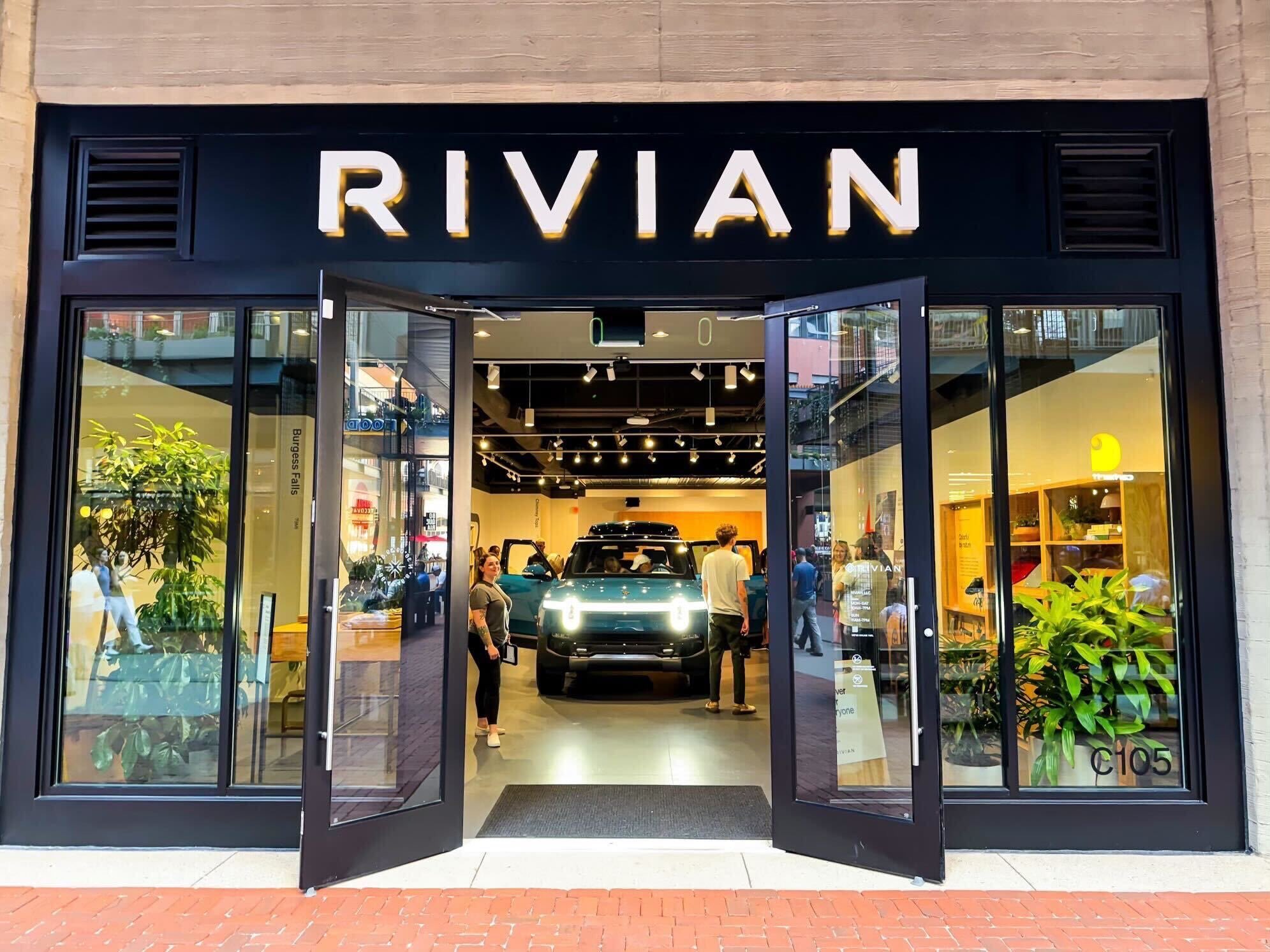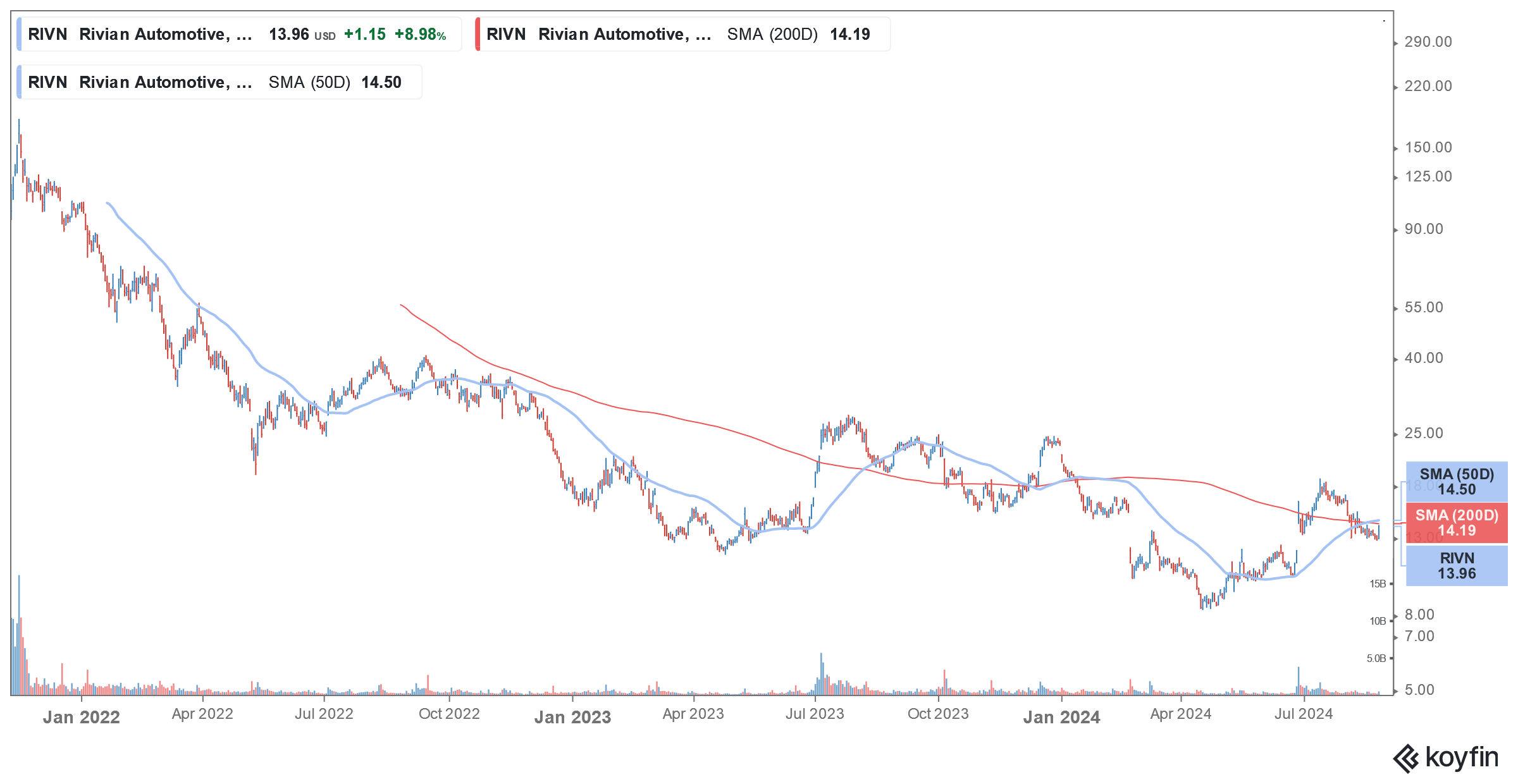
Rivian shares rose almost 9% yesterday as investors pumped money into growth companies amid rising optimism over a September Fed rate cut following chair Jerome Powell’s comments at the annual Jackson Hole Symposium.
“The time has come for policy to adjust. The direction of travel is clear, and the timing and pace of rate cuts will depend on incoming data, the evolving outlook, and the balance of risks,” said Powell at the widely-awaited event.
Rivian shares rise amid rally in growth companies
Growth shares like Rivian stand to benefit from lower interest rates and no wonder these names rallied smartly after Powell’s dovish comments, post which a September rate cut looks more or less a done deal.
Rivian scored a big win earlier this year after German auto giant Volkswagen announced a $5 billion investment in the startup electric vehicle (EV) company.
Volkswagen announced a $5 billion investment in Rivian
In June, Volkswagen announced a massive $5 billion investment in Rivian which was a big stamp of approval for the company. Notably, last year Volkswagen also invested in Chinese EV company Xpeng Motors and is also the biggest shareholder of solid-state battery company QuantumScape.
The deal would help strengthen Rivian’s balance sheet. While the company still holds a decent amount of cash, it has also been burning billions of dollars every year as it ramps up its production capacity.
While Rivian is currently posting losses, the company expects to start churning out a gross profit by the end of this year.
Analysts See Volkswagen deal as a key driver for Rivian
Dan Ives of Wedbush Securities who has an outperform rating and $20 target price on Rivian shares is optimistic about the company’s partnership with Volkswagen.
In his note, Ives said, “R1 lineup from a production standpoint, successfully completing its re-tooling upgrades which was a necessary step for the company’s future trajectory with a now expected 30% improvement in the R1 production line rate which we believe should positively impact the margin.”
He added, “For now, it is all about setting up the stage for its Gen 2 R1 vehicle production and preparation for the 1H26 R2 launch highlighted by the VW Joint Venture’s boost on its balance sheet which is expected to close in 4Q24. Over the quarter, Rivian had made some significant improvements in the story looking forward.”
EV shares have sagged
When Rivian went public in 2021, it became the biggest listing since Facebook’s (now Meta) 2012 IPO after the startup EV company raised almost $12 billion from the IPO. The IPO came at a time when EV shares were quite popular among investors.
That year, Tesla’s market cap surpassed $1.2 trillion while Rivian’s topped $150 billion. Even NIO briefly became a $100 billion company. Cut to 2024 and EV names across the board have plummeted.
EV listings have also plummeted and Zeekr is only the second major EV company to go public since last year. In 2023, Vietnam-based VinFast went public through a special purpose acquisition company (SPAC) merger and while the shares soared initially, they trade at just around a third of the SPAC IPO price now.
EV price war and slowing demand have taken a toll on price action
The EV industry is grappling with slowing demand and the worsening price war. Notably, Tesla’s deliveries fell YoY in the first half of 2024 and the jury is out on whether the company would be able to grow its deliveries in the full year.
Rivian too guided for 2024 production of 57,000 units which is slightly below what it produced in 2023. While the fall in production is largely due to the plant retooling that the company did, EV demand hasn’t kept pace with the massive capacity that both legacy automakers and pure-play EV companies have collectively installed.
The next big risk that EV companies like Rivian face is the likelihood of Donald Trump returning as the US president. Trump – a climate change denier – has vowed to reverse the EV-friendly policies that his predecessor Joe Biden implemented.
Rivian has a strong balance sheet
EV demand hasn’t been as strong as markets expected prompting companies to readjust their production plans. For instance, both Ford and General Motors which have committed billions of dollars towards building EV plants are delaying their investments. Startup EV companies have been under even severe stress and are grappling with continued cash burn. Several startup EV companies have either gone bankrupt or are on the verge of doing so.
That said, Rivian’s strong balance sheet would help it cope up with the industry-wide slowdown much better than its financially weak peers.


Question & Answers (0)